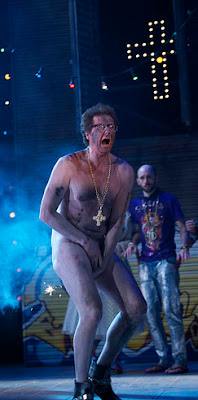 |
Welcome to the frathouse: Propeller's Comedy of Errors. |
But before you pop those champagne corks over a post-modern masterpiece, ponder that neither of these pop editions of Comedy and Richard actually do their sources justice. (Comedy is by far the stronger of the two, although Richard has its fascinations.) No doubt the print reviewers will sing the praises of both - and not without some cause; they're probably the strongest "big" Shakespeare we've seen in these parts in months, if not years (overall they're more impressive than the recent F. Murray Abraham Merchant of Venice). Still, the success of Propeller's clever "updates" of the Bard via multiplex tropes and attitudes only deepens the critical paradox these productions present, and represent.
But let's back up a bit. A major twentieth-century critical project - from the first "modern dress" Shakespeare productions through Peter Brook's "theatre of cruelty" to the early conceptual seasons of the A.R.T. - was rescuing the Bard from the distortions of earlier ages. In previous centuries, sentimentalism had bent Shakespeare to its will, and adaptations and interventions were often the order of the day (even King Lear was re-written with a happy ending, by the notorious Nahum Tate). But modern reformists hoped to scrape the saccharine detritus of some three centuries away from the Shakespearean tradition, and start fresh with a more authentic version of the Bard, one we could recognize, as Jan Kott famously put it, as "our contemporary."
But making Shakespeare our contemporary often has the downside of down-sizing him; because, face it, he's bigger than we are (although that's not what millennial narcissists like to hear). Indeed, the greatest Shakespearean interpretations, I'd argue, should surprise our own society with fresh insights about itself. But few of our critics or academics are interested in holding up an unflattering mirror to their customers; instead, our cultural consensus is happy to pound a contemporary template onto the Bard. Which is exactly what Nahum Tate used to do.
 |
Dugal Bryce-Lockhart locks lips with Robert Hands. |
But what's oddest about their same-sex casting, at least in Comedy of Errors, is how it re-inforces, rather than subverts, issues of gender and identity. In fact I don't think I've ever seen quite as butch a production of Comedy as the Propellants offer here. Not only is violence the lingua franca of the piece (even the nuns brandish riding crops!), but all the "women" are costumed in uniform mini-skirts and hooker heels (see abbess at top) that hint at porn-derived gender roles. By the time someone has run across the stage naked with a sparkler up his bum (at right), and the local cop has been anally violated with his night stick, you realize we're deep in the frathouse (the whole thing even takes place in some frat-style south-of-the-border luau) where everyone is bound to the rigid codes of masculine dominance, desire and disgust that you often find there, but which have little to do with Shakespeare.
Of course all this only makes the Propellants seem up-to-the-minute, doesn't it. We live in an age of feminists who are suspicious of the feminine, so it's no surprise they're suspicious of Shakespeare, too, who is always suggesting that men should act more like women, but rarely that women should act more like men. Thus, weirdly enough, Hall manages to sell the Propellants' sexism as a critique of Shakespeare rather than a reflection of contemporary attitudes.
Still, you have to admit - fratboys are funny in short bursts, and there's no denying much of Comedy is cruelly hilarious. And there was some great drag acting on hand from Robert Hands (above left) as the piece's put-upon wife, Adriana (Quick grad-student thesis topic: Adriana as Shakespeare's only portrait of Anne Hathaway, with himself as an internally-doubled model for Antipholus: discuss!). I also got a kick out of the wittily self-conscious turn from David Newman (before he started with the num-chucks) as Adriana's more conventional sister. Whenever these two were onstage, Comedy played as a smarter version of the Gold Dust Orphans. Alas, as the identical twins in their lives, Dugald Bruce-Lockhart and Sam Swainsbury seemed more superficial (if no less theatrically savvy), and their slick, disco-dud sleaziness grew old before the show was over. Meanwhile director Hall never really differentiated their personalities, or their differing relationships with their twin servants (features which are quite clear in the text).
Indeed, not much that intrigues us today about The Comedy of Errors seems to have been top-of-mind for Hall. For if, as I argued recently, Cymbeline recapitulates the canon, then Comedy all but predicts it. Twins, shipwrecks, double identities, threatened executions, fears of adultery, flights of love poetry, even a last-minute family re-union - they're all there in embryo in The Comedy of Errors, which is studded with hard little thematic buds that would later flower in plays as disparate as The Taming of the Shrew and Pericles.
It would be difficult to suggest those later dramatic riches, I admit, in a production that also aimed for the funnybone - but still, that litany of plays (and modes) suggests there's far more tonal modulation to be found in Comedy than Edward Hall seems to have sought. So even as I laughed (and I often did), I sensed that something essential was always missing from the mix - much as I did in Richard III; but those are thoughts I'll explore more fully in the second part of this double review.

No comments:
Post a Comment